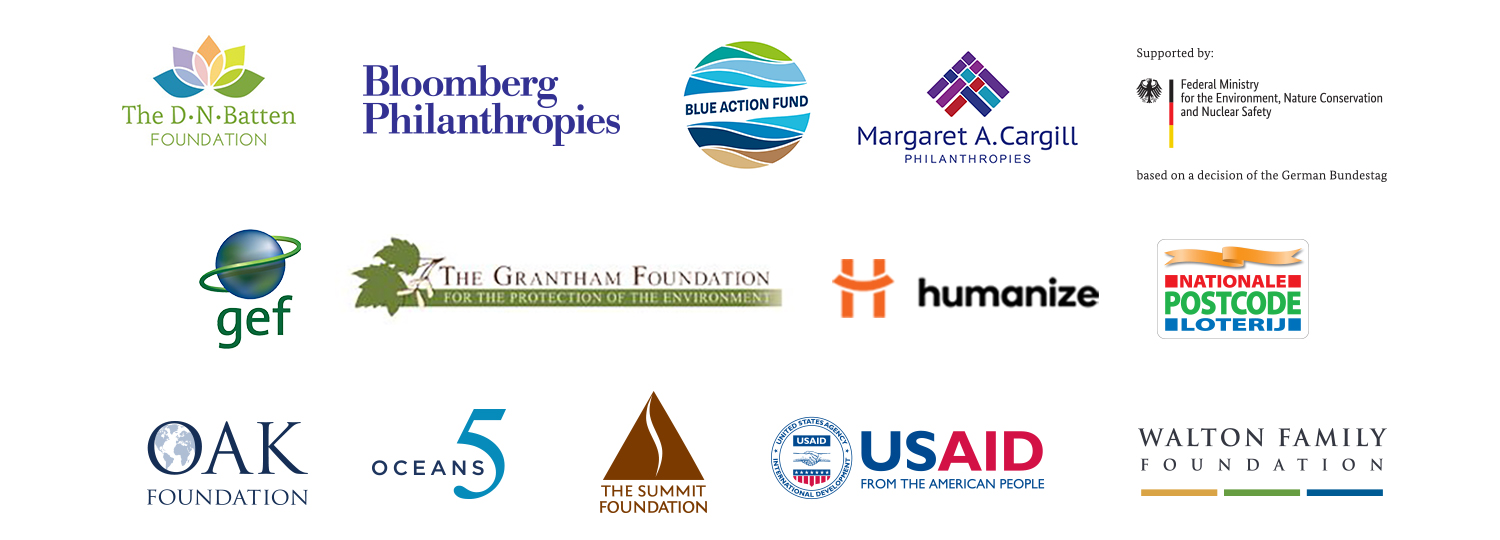Make sure you never miss an update. subscribe to the progress update newsletter
In this issue, find news and updates on:
Growing Blue Conference in Mozambique
MAR Mayor’s Summit
Surfacing the True Value of Honduras’ Small-Scale Fisheries
Four Behaviors Behind Responsible Fishing
Taking Stock of Fish Forever in Brazil
In Other News
The Science of Fish Forever
The Human Face of the Blue Economy
Fish Forever represents coastal fishing communities at the first Growing Blue Conference in Mozambique
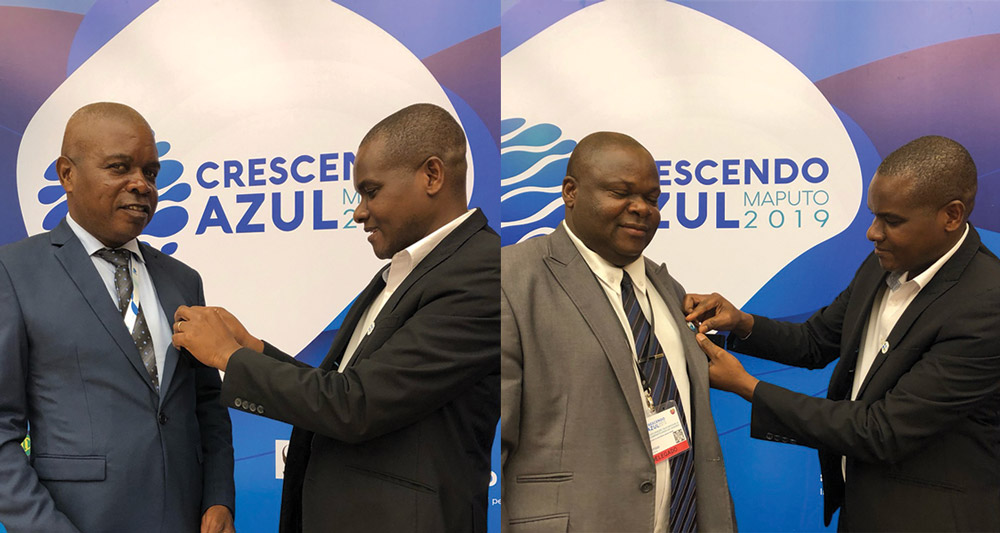
In his welcome address at the first Crescendo Azul (Growing Blue) conference in Maputo, May 23-24, Mozambique President Filipe Nyusi encouraged the event’s 500+ participants to take advantage of the “gifts” that the ocean provides for eradicating poverty and securing peace, prosperity, and sustainable natural resource use throughout the region. Importantly, President Nyusi, alongside others who offered opening remarks (the President of Seychelles, Mozambique’s Minister of Fisheries, the President of the International Fund for Agricultural Development, and the UN Special Envoy for the Oceans), noted the critical role of the small-scale fishing (SSF) sector in developing a sustainable and inclusive Blue Economy in Mozambique and regionally.
Balancing protection and production in a region with increasing interest in oil and gas development, mineral mining, and large-scale aquaculture remains a delicate challenge. Despite these competing interests, Growing Blue 2019 provided several opportunities to recognize and highlight the importance of SSF to the Blue Economy, noted below.
Linking Biodiversity and Conservation through Small-Scale Fisheries
In the Biodiversity and Conservation plenary, Rare Policy Director, Anna-Marie Laura, drew attention to SSF’s outsized role: “Small-scale fisheries, which operate in territorial (or coastal) waters and hold most marine biodiversity, serve as the basis of survival for many fishing-dependent communities. This sector is not only critical for protecting biodiversity, but for alleviating poverty and ensuring food security, gender equity, resilience to climate change, and economic development as part of a balanced Blue Economy.” Rare’s work to link conservation with improving livelihoods and food security in sites across Mozambique’s coast, funded by the Blue Action Fund, is an example of a solution that integrates sustainable development of its coastal communities and marine resources with national sustainable development goals.
Sustainable Small-Scale Fisheries in the Digital Age
Rare and Mozambique’s National Fisheries Administration (ADNAP) co-hosted a side event, “Sustainable Small-Scale Fisheries in the Digital Age”, which stressed the urgent need to strategically invest in a digital electronic registration and licensing system for managing the country’s small-scale fisheries and surfacing the true value of Mozambique’s small-scale fisheries to the global blue economy. The event highlighted how such technology would serve as the basis to create small-scale fisheries management plans, line up local government financing for management, establish links with formal markets and new opportunities for public-private partnerships, and ultimately, support co-management of coastal resources.
“During [this] event, we learned a lot and were happy to share our experience. The government, at all levels from national to local, has the responsibility to make sure there is support for sustainable management. We do this by working with communities to create management plans and empowering them to own its implementation so that it can be sustained. Participation from communities is critical to sustainability and better fisheries management.” -Mr. Lucas Simbine, Inharrime District Administrator. Similar interventions were also expressed by district administrators from Fish Forever sites, including Mr. José Jeremias (Massinga), Ms. Dulce Cunhemba Cuna (Inhassoro), and Mr. Tomé Dambuza (Machangulo Head of Post).
Participation from communities is critical to sustainability and better fisheries management.”
Mr. Lucas Simbine, Mozambique Inharrime District Administrator, who committed to joining the growing network of local leaders for sustainable small-scale fisheries
Several districts requested continued support from Rare to expand the fisher registration and catch reporting platforms in their coastal districts and nationally, including in the freshwater (inland) fisheries of Tete and Niassa provinces. The fisheries ministry’s technical bodies in charge of fisheries management and catch statistics have been working alongside Rare Mozambique staff to explore avenues for fully adopting a tool to register all the country’s small-scale fishers. The event also highlighted the link between the World Bank/SWIOfish “Mais Peixe Sustentável” (More Sustainable Fish) initiative and small-scale fishers’ transition from the informal to the formal economy.
Expanding the Network of Local Leaders for Sustainable Small-Scale Fisheries
After a dinner among district leaders, Mr. Lucas Simbine and Mr. Jose Jeremias, District Administrators of Inharrime and Massinga, respectively, joined the growing network of local leaders for sustainable SSF. These two leaders join mayors in the Mesoamerican Reef region (now 16 in Honduras, and one in Guatemala) and 12 coastal Filipino leaders that took the same pledge during national events in their respective countries over the last several months. By joining the local leaders’ network, they embrace community-led approaches to strengthening coastal fisheries, commit to sharing experiences with other local leaders, and publicly recognize the commitment to their District’s fishing communities.
To Protect the Marine Resources of the Mesoamerican Reef, Honduran Coastal Mayors Commit to Coastal Fisheries Reform
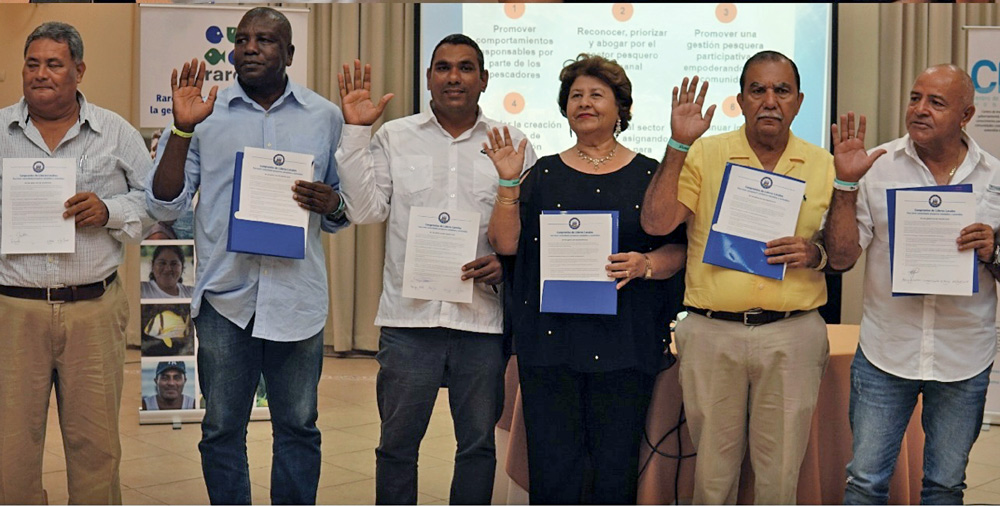
From May 7-9, the Association of Honduran Municipalities (AMHON) held its annual meeting in Tela, a town on Honduras’ Caribbean coast. As mayors and other representatives from the nation’s 298 municipalities met to discuss challenges and successes and plan the year, one particular bright spot shined through—the growing network of coastal mayors committing to protect the Mesoamerican Reef region’s waters, reefs, and marine resources that sustain their communities.
During an evening event hosted by Rare and the Center for Marine Studies to celebrate their progress, 14 mayors from coastal communities across Honduras’ Caribbean coast and Bay Islands publicly pledged to support healthy and sustainable fishing communities.
“I feel very satisfied today because what we are seeing is teamwork. This started in Guanaja, but we now have commitments from more mayors. Fishers now have reasons to be hopeful,” said Guanaja Mayor Spurgeon Miller, who led mayors in publicly pledging to safeguard the marine resources coastal communities depend on. The Mayor referenced an effort last year in which a group of coastal mayors in the MAR declared their support for establishing networks of marine reserves.
These 14 Honduran mayors joined 12 Filipino leaders who took the same pledge during a summit of 300 Filipino coastal mayors that Rare helped facilitate this past March. Their commitment is a step forward in growing a global movement of local leaders taking action to protect the natural resources that sustain their communities; Fish Forever aims to engage 500 local leaders and 1,000,000 fishers worldwide in this effort.
For the full article, including pledge commitments, see HERE.
Surfacing the True Value of Honduras’ Small-Scale Fisheries
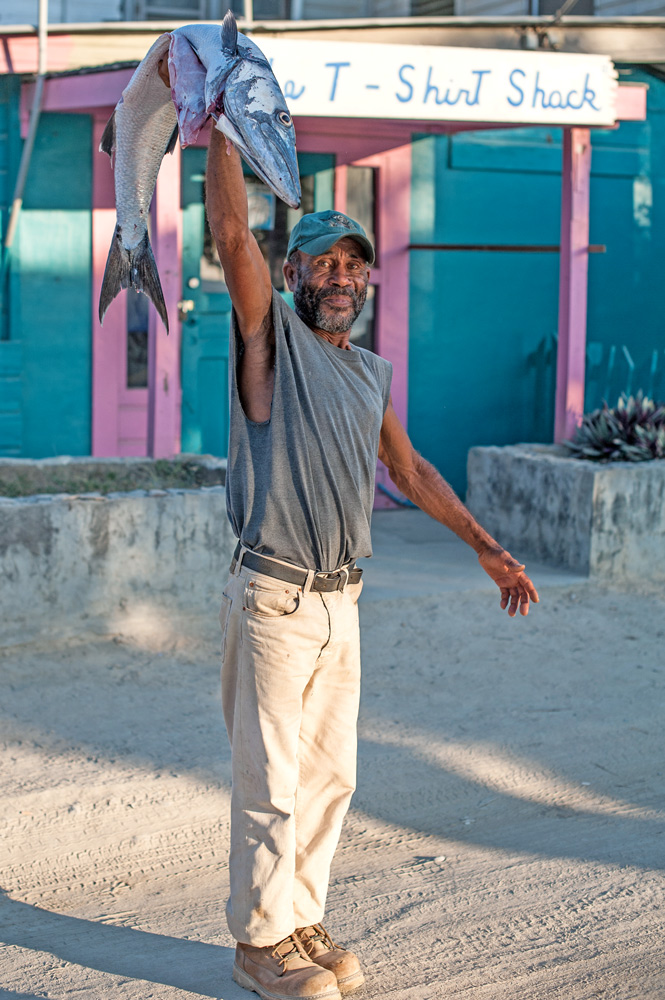
Earlier this month, the Smithsonian Institution, in collaboration with the Sea Around Us initiative and Fish Forever Sr. Vice President, Steve Box, published a new report in Fisheries Management and Ecology that surfaces the true value of small-scale fisheries in Honduras. “The hidden value of artisanal fisheries in Honduras” highlights the importance of Honduras’ coastal fisheries to both the local and national economy and challenges the long‐held belief that the industrial fisheries are more important.
This groundbreaking report is one of the first publications to show that both the catch volume and value of a country’s small-scale fisheries exceed that of industrial fishing. By disaggregating catch data for industrial and artisanal fisheries and adding up best estimates of unreported catches by each fishing sector, the researchers discovered that from 1996 onward the small-scale fishing fleet caught more fish, and from 2000 onwards had bigger revenues, than the industrial fleet.
Once the researchers had reconstructed the catch for each sector, they observed that industrial catches started declining in 1986 and dropped dramatically in the mid-2000s. They also concluded that aggregating the data in official statistics obscured this decline, hiding the strong growth of the small-scale fishing sector, and ultimately, limited the country’s ability to accurately value its small-scale fisheries for decades. The report points to the informality of the coastal fisheries sector as the driver behind their underestimation. “The majority of artisanal fisheries in Honduras are within the informal sector, and therefore no official records of catches or the associated value exist, which proliferates the underestimation of their importance to coastal communities and their economies.”
Co-author Dirk Zeller, Director of the Sea Around Us – Indian Ocean at the University of Western Australia, asserts the need for action. “This highlights the urgent need for comprehensive fisheries management and reporting systems in Honduras.”
The report highlights the use of the digital app OurFish as a solution to small-scale fisheries data collection, dissemination, and use in Honduras. Rare and partners in the region are supporting coastal fishing communities’ use. Importantly, this publication reinforces critical elements of Fish Forever’s approach—the need to collect data and make it readily accessible for decision-making; establish ways to connect small-scale fishers to the formal economy through financial and market inclusion; prioritize small-scale fisheries alongside industrial fisheries; and engage fishing communities and their local leaders in transforming the sector.
The publication coincides with a Mayors’ Summit in Honduras (read about that HERE), where 14 coastal mayors have pledged to protect the natural resources and the communities that depend on them.
Co-author Steve Box reinforces the link between better data and a sustainable coastal fisheries sector in Honduras: “The results of this report are likely the case in many other developing countries with coastal fisheries. Without data about what small scale fishers are catching, it’s impossible to manage these fisheries effectively. What’s exciting is that Honduras is a leader in solving this problem and Rare, working with partners, is proud to support systemic change that will empower communities to collect better data, sustainably manage their fisheries, protect marine life and improve fisher livelihoods.”
Inspiring Change: Four Behaviors Behind Responsible Fishing
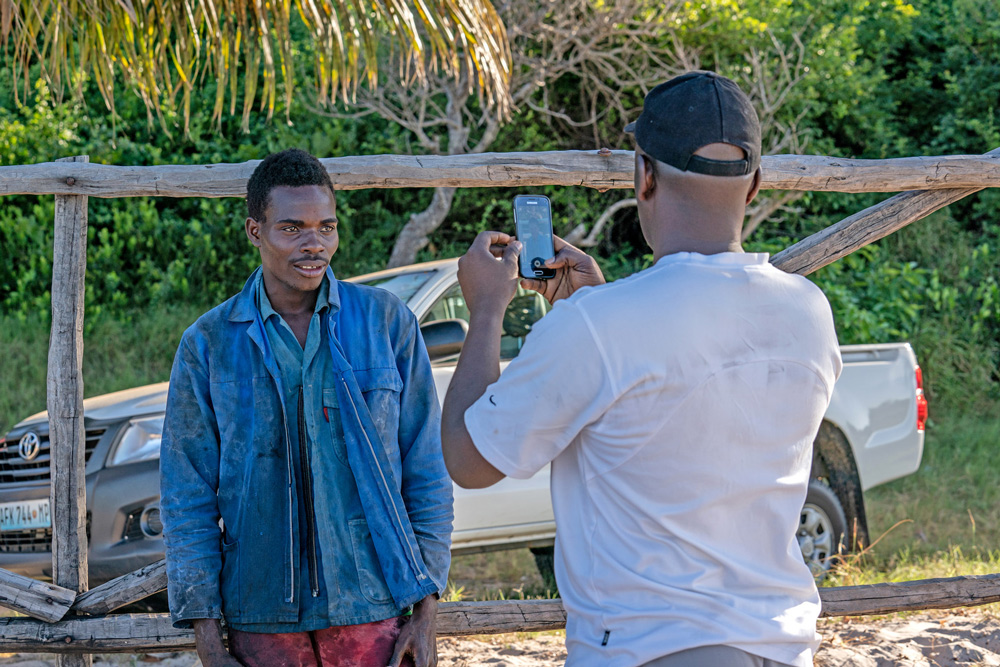
We’ve all experienced one of life’s timeless sayings: Change is hard. But we need change. It inspires us. Helps us adapt. Promotes growth. Triggers progress. And to address urgent environmental challenges, like overfishing, we need to overcome real and perceived barriers to change the way we live, the way we think, and the way we behave.
Take the case of small-scale fisheries — a highly distributed, often marginalized, and relatively invisible sector despite the critical global economic and social benefits it provides. Helping fishers and their communities adopt more responsible fishing behaviors to curb overfishing is not only a ‘nice-to-have’ — it’s imperative for the estimated 200 million people around the world who depend on small-scale fisheries for food and livelihoods.
But what exactly does it mean to adopt more responsible fishing behaviors — what are the behaviors that need to change, why are these the right ones, and importantly, how do we do it?
Click HERE to read the full feature.
Taking Stock of Fish Forever in Brazil

Today we realize that fishers, family, and community are increasingly united and strengthened to promote responsible fishing.”
João Lima Coelho, Brazilian Fisher and Local Leader, during the recent program evaluation
Rare in Brazil recently convened 40 program partners from Pará, Maranhão, Piauí, and Pernambuco states to assess the results of Fish Forever’s ten fisheries campaigns (from 2017-2019) and share the new program strategy in Brazil. The campaigns, which leveraged behavioral insights to help fishing communities adopt more responsible fishing behaviors and address the lack of trust between communities and the government, engaged 4,300 fishers across 49 communities and 11 marine protected areas (MPAs). Three sample program results and takeaways are below.
The campaigns improved community participation and representation in fisheries management.
I am glad to be part of the sub-national State Fishing Council of Pernambuco. Now I can contribute more to fisheries management.”
Severino Santos, Campaign Manager
The campaigns trained over 700 fishers and local leaders to participate in resource co-management and decision making through community-led fisheries management bodies and committees. They also facilitated peer-to-peer learning experiences for 120 fishers and fish buyers through exchange trips to other fisheries. Building the capacities of fishers, local leaders, and local fisheries associations will remain a critical strategy for building the relationships, and conditions necessary, for sustainable coastal fishing in the country.
Fish Forever’s efforts to convene multiple stakeholders strengthened a network of institutions and communities committed to sustainable fishing.
Partnering with Rare is fundamental to continue training local leaders and supporting ongoing capacity building of local associations.”
Sandra Regina Gonçalves, CONFREM Regional Coordinator in Pará
The campaigns helped approve six new technical proposals to manage fisheries and target species in MPAs: e.g., a new management plan for Delta do Parnaíba’s *APA, and new ordinance that defined boundaries for gear restrictions in its RESEX; In Resex Cururupu, ICMBio endorsed the management body decision to establish a rotations system for reducing overfishing in acoupa weakfish spawning grounds. (*APA and Resex=types of MPAs).
A major challenge facing coastal fisheries management in Brazil remains: a lack of the basic data available for timely, localized and community-based management: who is fishing, where they’re fishing, and what they’re catching.
Not having this basic data makes it hard to establish new regulations, establish social rights for fishers, and overall, quantify the full pressure of chronic fishing in coastal waters.”
Natali Piccolo, Rare Brazil Senior Manager
Going forward, Fish Forever in Brazil will work with partners to address data collection and use and improve decision-making. On May 9th, Rare inaugurated its new headquarters in Belém—the Amazon’s second largest city. Monique Galvão, Vice President of Rare in Brazil, sees the new location as a strategic opportunity to enhance program successes and address its challenges: “To be closer to the communities and Resex will leverage campaign implementation in the territories where we are working.”
In Other News
Cyclones Adai and Kenneth delay program implementation in Mozambique
Cyclones Adai and Kenneth affected the north and central coastal areas of Mozambique. Fish Forever is still assessing how this will impact work with coastal communities in Sofala province.
Broadening the Use of Village Funds for Indonesia’s Coastal Fisheries
In collaboration with Southeast Sulawesi (SES) Province’s Office of Marine and Fisheries and Office of Community Empowerment and Rural Development, Rare co-organized a workshop in Kendari to discuss how Indonesia’s Village Funds can finance coastal fisheries management and reform costs. Village Funds—i.e., government-sourced financing aimed at stimulating village-based development—have historically been used to support land-based or agricultural activities, not marine resource activities. Expanding the eligible activities to include coastal fishing activities and incorporating them into the national 2020 Village Fund Guidelines will help to create a sustainable source of government funds for fisheries management and reform in Indonesia. The 56 workshop attendees included fishermen’s group representatives, Village Fund facilitators, and Heads of Villages and Sub-districts, Heads and officials of the Agency for Community Empowerment and Rural Development (district level), and Agency for Cooperative and Small & Medium Enterprises (provincial level), as well as officials from the Ministries of Village and Home Affairs. The SES provincial government will submit these proposed activity examples to the Ministry of Villages for consideration.
People, Behavior, and Vibrant Oceans Webinar – May 30th
On Thursday, May 30th, Dr. Steve Box, Sr. Vice President of Fish Forever, and Melissa Wright, Oceans Lead for Bloomberg Philanthropies, co-hosted a free webinar to explore the critical role that human behavior plays in addressing one of the greatest threats to our oceans. The recorded webinar is available HERE.
A Digital History Builds a Financial Future for Zulma
Zulma was in trouble. The past fishing season in El Porvenir, her Honduran coastal town, was plagued with bad weather, and the ten fishers who usually sold her fish, lobster, conch, and crab didn’t catch enough for her to buy and resell. The future seemed bleak until she realized that a decision she made a year ago—to start using an app called OurFish—might provide a solution… READ MORE
Fishing for Climate Resilience in Asia Pacific Bootcamp
Rare Philippines held a weeklong boot camp to kick off the Fishing for Climate Resilience Project in the Philippines, Indonesia, Palau, the Federated States of Micronesia and the Marshall Islands. The project aims to empower vulnerable, fisheries-dependent communities in these five countries to adapt to climate change. The boot camp, attended by almost 100 participants and eight subnational partners in 19 different sites, was the first training activity for both site implementation teams and codelivery partners. Back in their sites, teams are now gathering secondary coastal resources and fisheries data and preparing for primary data collection scheduled in June, which includes activities like habitat assessments, focus group discussions, stakeholder mapping, and key informant interviews. This project is part of the International Climate Initiative (IKI). The Federal Ministry for the Environment, Nature Conservation and Nuclear Safety (BMU) supports this initiative on the basis of a decision adopted by the German Bundestag.
Marine Mammal Survey in the Philippines’ Tañon Strait
In early May, dwarf spinner dolphins were spotted in the Tañon Strait as part of a marine mammal survey conducted by a multi-agency team led by the Department of Environment and Natural Resources and Rare. Six species of marine life were recorded and photographed during the survey. A story about this survey is forthcoming.
What We’re Reading
Reconstruction of larval origins based on genetic relatedness and biophysical modeling (May 2019)
Segura-García, I., Garavelli, L., Tringali, M., Matthews, T., Chérubin, L.M., Hunt, J. and Box, S.J., (2019). Reconstruction of larval origins based on genetic relatedness and biophysical modeling. Scientific Reports, 9(1), p.7100.
This study assesses fine-scale temporal genetic variability and population connectivity of one of the most commercially valuable coastal species in the Caribbean, the spiny lobster. It found that strong connectivity exists among populations due to long larval duration and ocean currents. The results underscore that high connectivity enhance persistence of local populations and inform the design of marine reserve networks to sustain both local and regional populations.
Situating human rights in the context of fishing rights – Contributions and contradiction (May 2019)
Song, A.M. and Soliman, A., (2019). Situating human rights in the context of fishing rights–Contributions and contradictions. Marine Policy, 103, pp.19-26.
This study applies a legal and applied perspective to distinguish key terms commonly used in a human rights-based approach to fisheries: human rights, customary fishing rights, and constitutionally protected rights to fish. The paper discusses that for small-scale fisheries, a human rights-based approach is most effective when it supports communal fishing rights distributed in a manner consistent with human rights principles.
Insights into the credit transactions of small-scale fishers along the south west coast of India (May 2019)
Parappurathu, S., Ramachandran, C., Baiju, K.K., and Xavier, A.K., (2019). Formal versus informal: Insights into the credit transactions of small-scale fishers along the south west coast of India. Marine Policy, 103, pp.101-112.
This paper examines diverse credit transactions adopted by small-scale fishers along the South West coast of India. By analyzing the most important local fishery (ring seiners) in the region, the study found that the informal financial sector (e.g., borrowing from peers) dominated over the institutional credit sector (e.g., borrowing from banks). This borrowing pattern has important implications for fisheries management and suggests recommendations for improvement.
Inclusive management through gender consideration in small-scale fisheries: The why and the how (Apr 2019)
de la Torre-Castro, M., (2019). Inclusive management through gender consideration in small-scale fisheries: The why and the how. Frontiers in Marine Science, 6, p.156
In this review article, the author argues that inclusive management through gender consideration is crucial to solve specific problems in small-scale fisheries. Gender inclusion should be considered in several aspects of management such as: participation; space, actors and activities; economic power; and equity and environmental stewardship. The author argues that gender inclusion may provide a basis for better policy and governance.
Protected area targets post-2020 (Apr 2019)
Visconti, P., Butchart, S.H., Brooks, T.M., Langhammer, P.F., Marnewick, D., Vergara, S., Yanosky, A., and Watson, J.E., (2019). Protected area targets post-2020. Science, 364(6437), pp.239-241.
This study evaluates progress towards establishing effective and representative networks of protected areas by 2020; a crucial goal to conserve biodiversity globally. Today, protected areas cover 15% of land and 7% of the oceans. Yet species population abundance within and outside protected areas have continued to decline, and placement and resourcing of most protected areas has been inadequate. The paper discusses solutions relevant to Fish Forever’s approach.
A Global Deal for Nature: Guiding principles, milestones, and targets (Apr 2019)
Dinerstein, E., Vynne, C., Sala, E., Joshi, A.R., Fernando, S., Lovejoy, T.E., Mayorga, J., Olson, D., Asner, G.P., Baillie, J.E.M. and Burgess, N.D., (2019). A Global Deal for Nature: Guiding principles, milestones, and targets. Science Advances, 5(4), p.eaaw2869.
This review describes a roadmap for a Global Deal for Nature (GDN), a time-bound, science-driven plan to save the diversity and abundance of life on Earth. Although the assessment is not directly related to improving small-scale fisheries management and livelihoods, the GDN focuses on protecting biodiversity through fully-protected reserves, mitigating climate change, and reducing threats—three core themes imbedded within the science of Fish Forever.
Evaluating the impacts of protected areas on human well-being across the developing world (April 2019)
Naidoo, R., Gerkey, D., Hole, D., Pfaff, A., Ellis, A.M., Golden, C.D., Herrera, D., Johnson, K., Mulligan, M., Ricketts, T.H. and Fisher, B., (2019). Evaluating the impacts of protected areas on human well-being across the developing world. Science Advances, 5(4), p.eaav3006.
This review synthesizes environmental and socioeconomic conditions of more than 87,000 children in over 60,000 households situated around >600 protected areas within 34 developing countries. The assessment found that households near protected areas with tourism have greater wealth, lower poverty levels, and children with better health than households located far from protected areas. The study concluded that protected areas can positively affect human well-being.
Fisheries improvement projects and small-scale fisheries: The need for a modified approach (Apr 2019)
Barr, R., Bruner, A., and Edwards, S. (2019). Fisheries Improvement Projects and small-scale fisheries: The need for a modified approach. Marine Policy.
This article discusses recommendations to expand the fishery-improvement-projects approach to improve small-scale fisheries. The authors recognize that small-scale fisheries reforms require comprehensive interventions to address their social and economic complexities. Investing in strengthening tenure and community governance, as well as broadening livelihood portfolios to reduce financial vulnerability are crucial for success.
Comanagement of small‐scale fisheries and ecosystem services (Apr 2019)
Gelcich, S., Martínez‐Harms, M.J., Tapia‐Lewin, S., Vasquez‐Lavin, F., and Ruano‐Chamorro, C. (2019). Comanagement of small‐scale fisheries and ecosystem services. Conservation Letters, p.e12637.
This literature review evaluates biodiversity and ecosystem services outcomes from allocating territorial user rights to artisanal fishers (TURFs) in Chile. Based on > 25 years of data, the review reaffirms that TURFs sustain biodiversity and ecosystem services when they are well enforced, and they can enable social and ecological conditions for local stewardship. The authors highlight the need to conduct more interdisciplinary social-ecological research and include climate change in management.
The hidden value of artisanal fisheries in Honduras (Mar 2019)
Canty, S., Funes, M., Box, S., Zylich, K., Derrick, B., Divovich, E., Lindop, A., Pauly, D. and Zeller, D., (2019). The hidden value of artisanal fisheries in Honduras. Fisheries Management and Ecology.
This study estimated the economic value of Honduras’ industrial and artisanal fisheries and found that catches were nearly three times greater than the official reports between 1950 and 2015. Underreporting of artisanal fisheries catches, which substantially increased in the 1990s, explains the discrepancy. Artisanal fisheries surpassed the value of the industrial fisheries by the early 2000s. This study underscores the importance of small-scale fisheries and the sector’s contribution to local and national economies.
Fish Forever: A solution to coastal overfishing – delivered by empowering communities through clear rights, strong governance, local leadership, and participatory management – that protects essential fish habitat and regulates fishing activities to replenish and sustain coastal fisheries.
Goal: To deliver replicable and scalable community rights-based management across ten countries, using a global network of 500 local leaders to secure livelihoods for one million fishers, alleviate poverty, ensure food supply, and protect coastal ecosystems from chronic threats.
Fish Forever Countries: Philippines, Indonesia, Mozambique, Brazil, and the Caribbean Coasts of Mexico, Guatemala, Belize, Honduras, Palau, Federated States of Micronesia, and the Marshall Islands.
Fish Forever is possible thanks to the support of many, including the following current donors:
